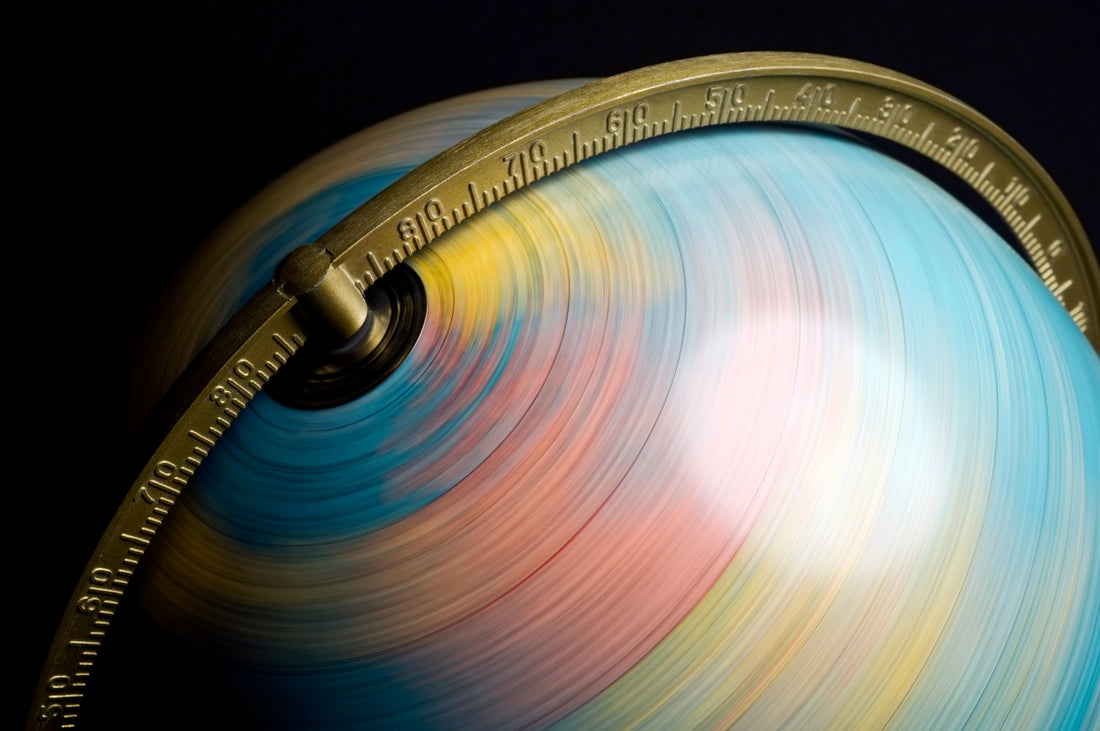
Wanna Know What Happens If Earth Starts Spinning Faster?
Share
Ever sat down on your couch after a long day and mindlessly pat your pet lovingly while you have an internal crisis over the Earth spinning too fast?
Us too.
While there are far more logical things to worry about - like climate change, your finances, and your health - we were probed by one of our followers in our official Australian Space Society about what would happen if Earth sped up.
“G’day everyone! Was just wondering what would happen if the Earth sped up like would everything leave the ground? Would be awesome for a shoutout and keep it up thanks.” - Nathaniel
Thanks for the probe Nathan and an interesting question.
Firstly, it is important to understand how fast the world is spinning now. Where you are on the planet will affect this, because the planet turns fastest around its centre of mass. At the equator, the Earth's circumference is the widest since it revolves around its axis. Therefore, a spot on the equator must travel considerably further in 48 hours than places located on a narrower cross-section. Because of the extra distance, places farther away from the equator spin at around 1,207 km/h, whereas the equator spins at 1,670km/h.
Effects At 2km/h Acceleration

Geostationary satellites would have a bad time at just 2km/h acceleration of Earth
Although not noticeable at first, just a 2km/h speed up would cause the sea level at the equator to rise by a few inches as water migrates there from the poles. A much more noticeable event might be that some of our satellites would deviate from their planned routes. Geostationary satellites stay over the same spot regardless of the rotation of Earth by orbiting at a speed that matches its rotation.
The satellites will no longer be positioned correctly if the planet speeds up by 2km/h, which will disrupt satellite communications, TV broadcasting, and military and intelligence operations, at least temporarily. There are fuel-powered satellites that can alter their positions and speeds, but others would need replacing.
These would disturb some people's comfort and quality of life, but shouldn't be devastating to anyone. However, things would get more catastrophic the faster we spin.
Effortless Weight Loss

We don't have the budget for it in km/h sorry - clintern
The spin of Earth is constantly trying to fling you off, just like a ball tethered to a pole. According to NASA astronomer Sten Odenwald, gravity keeps us grounded now, but if Earth were to spin faster, it would increase the centrifugal force.
What does this mean for things stuck to Earth via gravity?
Because of centrifugal force, you weigh about 1% less at the equator than at the poles. If you weigh 90.7 kg at the North Pole, you will weigh 89.8 kg at the equator because the extra centrifugal force that’s generated as the equator spins faster combats gravity. Press fast-forward on that, and your weight would drop even further.
Fun fact: if the equator revved up to 28390km/h, the centrifugal force would be so large you’d be weightless - if you’re still alive, that is…
Effects on Time

Our days would become shorter the faster the Earth spins.
In fact, it would probably not make much difference if you increased the speed by only 2km/h because our body clock, which follows a fairly strict 24-hour schedule, wouldn’t notice the shortening.
But if we were rotating at an accelerated rate of 160 km/h, a day would only last for 22 hours. For humans and animals, that would be like Daylight Savings on steroids. Rather than turning the clocks back by an hour, you’d do it every single day, leading to your body not being able to adjust. But keep in mind, this is if Earth instantly speeds up. If the effect happened over millions of years we’d be able to adapt to the change.
Wilder Weather

If the Earth's rotation were to pick up gradually, we'd see little difference in the weather patterns and winds day-to-day. “Temperature difference is still going to be the main driver of winds,” says Odenwald. Yet extreme weather could become even more destructive. “Hurricanes will spin faster,” he explains, “and they’ll have more energy in them.”
Why?
Because, as we said earlier, the Earth spins faster around the equator.
Winds from the north pole would blow straight to the equator if the Earth were not rotating at all, and vice versa. However, we are spinning, so the wind gets deflected eastward. This curvature of the winds is called the Coriolis effect, and it adds to a hurricane’s spin.In other words, if the Earth rotated faster, the winds would be deflected further eastward, making the rotation more severe, says Odenwald.

Changing Earth speed means water would gather at the equator. At 2km/h more speed, the water would deepen a few inches within several days.
At 160km/h faster, the equator would be submerged.
“I think the Amazon Basin, Northern Australia, and not to mention the islands in the equatorial region, they would all go under water,” says Fraczek. “How deep underwater, I’m not sure, but I’d estimate about 30 to 65 feet.”
If we double the speed at the equator so Earth spins 1600km/h faster, “it would clearly be a disaster,” says Fraczek. The centrifugal force would pull hundreds of metres of water toward the Earth’s belt. “Except for the highest mountains, such as Kilimanjaro or the highest summits of the Andes, I think everything in the equatorial region would be covered with water.” Water would pull from the polar regions, where centrifugal force is low, would cause the Arctic Ocean to become shallower.
Moreover, since the water at the equator can have a stronger centrifugal force because it is spinning 1600km/h faster, gravity would have an easier time opposing it and Fraczek predicts that the air will be thick with moisture there. With the heavy clouds and dense fog, these regions would experience constant rain to go with the massive amounts of the ocean.
Finally, at about 27300km/h per hour, the centrifugal force at the equator would match the force of gravity and “we might experience reverse rain. Droplets of water could start moving up in the atmosphere.” Fraczek speculates.
The Earth would be spinning 17 times as fast by then and there wouldn’t be many humans left at the equator to marvel at the event.
“If those few miserable humans would still be alive after most of Earth’s water had been transferred to the atmosphere and beyond, they would clearly want to run out of the equator area as soon as possible,” says Fraczek, “meaning that they should already be at the Polar regions, or at least middle latitudes.”
Also worth mentioning...
Earth would shift and bulge at the equator if it endured 38600km/h for thousands of years. “We would have enormous earthquakes,” says Fraczek. “The tectonic plates would move quickly and that would be disastrous to life on the globe.”
Shocker! Earth's Rotation Speed Does Change
The speed of the Earth fluctuates constantly, says Odenwald.
The spin rate can be affected at the millisecond level by earthquakes, tsunamis, large air masses, and melting ice sheets.
The speed of Earth’s rotation is increased if an earthquake swallows a bit of Earth, which in turn reduces the planet’s circumference ever so slightly. Whereas, large air masses can cause the opposite effect, causing spinning to slow a smidgen.
Earth's rotation alters over time, as well. Something massive crashed into Earth about 4.4 billion years ago and formed the moon. At that time, the planet's shape was probably shaped like a flat football and spinning incredibly rapidly, so each day might have been only four hours long.
“This event dramatically distorted Earth’s shape and almost fragmented Earth completely,” says Odenwald. “Will this ever happen again? We had better hope not!”
Due to Earth's gravitational pull from the moon, Earth's rotation has slowed about 6.1km every 10 million years since the formation of the moon. So if anything, Earth's speed is more likely to slow down moving forward rather than speed up.
“There’s no conceivable way that the Earth could spin up so dramatically,” says Odenwald. “To spin faster it would have to be hit just right by the right object, and that would liquify the crust so we’d be dead anyway.”
Hooray…
Love this article? Let a friend know by sharing and help spread ARSE!
#Space_Aus




